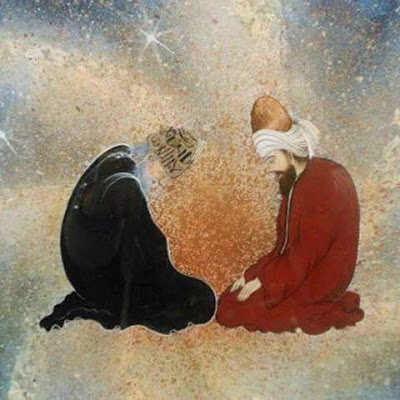Rather Weep For Yourself
 Someone was weeping: "The Tatars killed my brother. He was a man of knowledge."
Someone was weeping: "The Tatars killed my brother. He was a man of knowledge."I said, "If you have knowledge, you know that with the strike of that sword the Tatar gave him endless life. But what do the dead, or dead preachers know about that life? They come up to the pulpit, and they begin a lamentation. I mean, the Prophet said. This world is the prison of the believer. Someone escapes from prison. Then you weep for him? What a pity that he escaped from this prison! The Tatars, or some other cause, made a hole in the prison. He escaped. He was transferred from one abode to another abode. Then you weep. 'What a pity that they struck the wall of the prison with that arrow! Why did they strike that stone! Didn't they regret that fine marble?'
"Or, there were stocks on his legs. they cut them off, and he escaped. You shout out and strike your head and weep: 'What a pity that they cut off the stocks!' Or, they broke a cage, and you weep in anguish - 'Why did they break the cage! Why did they let the bird go!' Or, they lance a boil, and the filth and pus come out. You begin lamenting. 'What a pity that the pus left!'
Shams-i Khujandi was weeping for the Household (of the Prophet) I was weeping for him: Why do you weep for the Household? Someone joins with God, you weep for him, and you don't weep for yourself. If you were aware of your own state you would weep for yourself. Rather, you would gather all your people together, all your relatives, and you would lament in anguish for yourself!
 There is no change in God. The change is in you. Sometimes you like bread and you seek for it, and sometimes you turn away. Sometimes you become warm towards a friend and he appears as your beloved. You say, "I love him." Then you change your color and you say: "I hate him!" If you were to stay constant in that state, he would always be sought and loved.
There is no change in God. The change is in you. Sometimes you like bread and you seek for it, and sometimes you turn away. Sometimes you become warm towards a friend and he appears as your beloved. You say, "I love him." Then you change your color and you say: "I hate him!" If you were to stay constant in that state, he would always be sought and loved.Shams
"Me & Rumi" William C. Chittick -Teachers and Shaykhs I Have Met


Yorumlar
Yorum Gönder